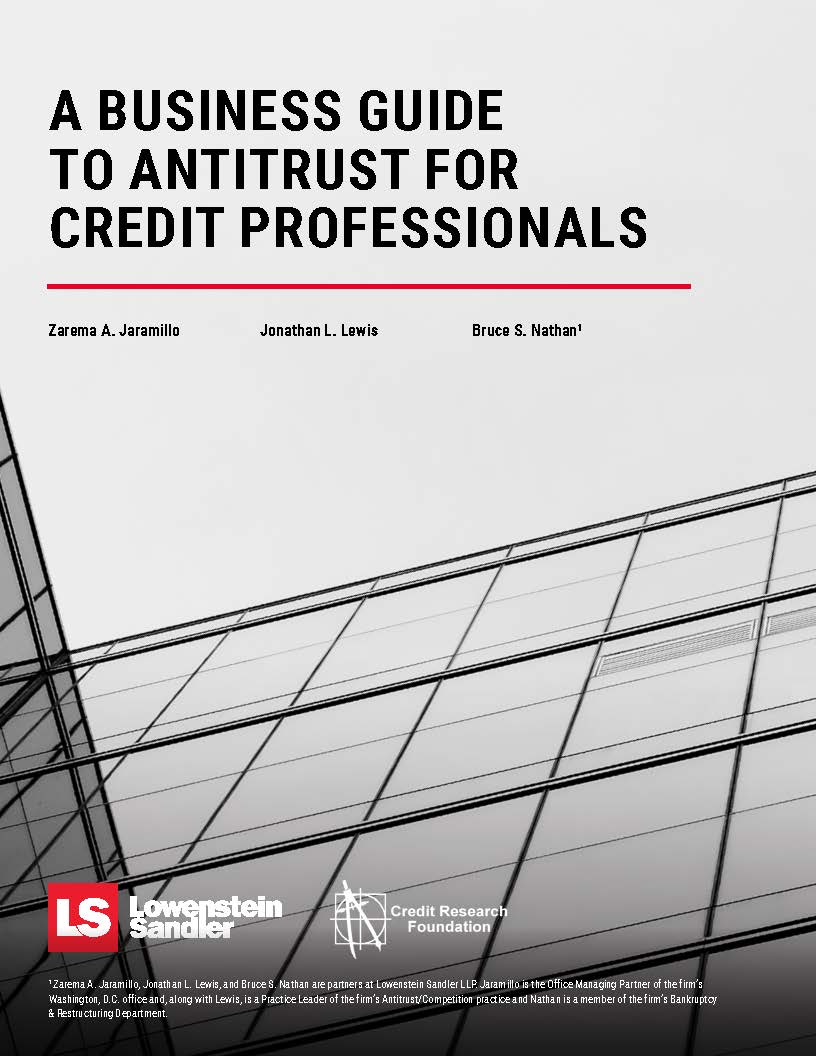Access "A Business Guide to Antitrust for Credit Professionals."
Zarema A. Jaramillo and Jonathan L. Lewis, partners in Lowenstein Sandler’s Antitrust/Competition practice, and Bruce S. Nathan, partner in the firm’s Bankruptcy & Restructuring Department, have published an updated version of the firm’s “A Business Guide to Antitrust for Credit Professionals,” a white paper initially released in 2020 at the request of The Credit Research Foundation, an educational and research organization dedicated to the credit, accounts receivable, and financial management community.
The publication provides practical guidance on avoiding antitrust violations in communications and information-sharing among credit professionals, addressing what information can and cannot be exchanged with other credit professionals, both one-on-one and in a credit group or other group setting; and defining parameters for information exchanges relating to a creditor’s joining an involuntary bankruptcy petition and serving on creditors’ committees. It offers an overview of the antitrust laws governing these issues, as well as helpful “dos and don’ts” for credit professionals participating in credit group and other meetings, creditors’ committees, and involuntary bankruptcy petitions.
The paper also discusses the Robinson-Patman Act and its impact on credit decisions, including what to do when confronted with requests for extended terms. Finally, it offers practical answers to frequently asked questions about such topics as what one should do if present during impermissible communications; and response strategies for requests for extended credit terms or to join in involuntary bankruptcy petitions.
“Current market conditions have led to a marked increase in bankruptcy filings,” says Jaramillo, “This means that credit professionals working with other creditors on restructurings must be especially mindful of antitrust laws in order to mitigate risk of violations and the resulting penalties, which can be onerous.”
Lewis adds: “Whether they are conversing at a golf event or engaging with peers at a professional meeting, members of the credit community need to know how to avoid potential antitrust violations and how to employ such strategies as the ‘noisy exit’ when noncompliant discussions arise.”
“Like all professionals, members of the credit industry need to gather and share information, whether it’s for broad industry analysis or to protect against bad debt risk and fraudulent customers,” says Nathan. “However, they need to be aware of best practices regarding gathering and sharing that information and what they are doing with it in order to avoid antitrust violations.”
Jaramillo, Managing Partner of Lowenstein’s Washington, D.C. office, represents clients in the financial services, technology, energy, and life sciences sectors in complex antitrust matters such as government investigations by the U.S. Department of Justice and the Federal Trade Commission, regulatory clearances in M&A transactions, and high-stakes antitrust class action defense. She regularly advises clients on enforcement matters before state and federal agencies, and counsels on competition issues, including refusals to deal, distribution and franchising restraints, pricing issues, exclusive dealing, joint ventures, and trade association activities. She also assists clients to develop comprehensive compliance programs, offering practical counsel on regulatory issues that arise in M&A deals, and advising on dispute resolution strategies.
Lewis represents clients across diverse sectors, including manufacturing, chemicals, pharmaceuticals, health care, and technology, advising on the management of their day-to-day business risks, corporate transactions, and litigation defense. Known for providing substantive antitrust analysis of proposed transactions, he counsels on merger review and pre-merger integration planning, distribution and franchising, and other business practices. He also represents clients before federal and state antitrust enforcement authorities in the course of investigations concerning distribution practices and pre- and post-merger review.
Nathan has more than 40 years of experience in the bankruptcy and insolvency field and is a recognized leader nationwide in trade creditor rights and the representation of trade creditors in bankruptcy and other legal matters. He has represented trade and other unsecured creditors, unsecured creditors' committees, secured creditors, and other interested parties in many of the larger Chapter 11 cases that have been filed. Nathan also handles letters of credit, guarantees, security, consignment, bailment, tolling, and other agreements and legal credit issues for the credit departments of institutional clients. He received the Top Hat Award in 2011, a prestigious annual award honoring extraordinary executives and professionals in the credit industry; he also coauthored “Trade Creditor’s Risk-Mitigation Tools and Remedies Manual," published by ABI in 2019.
Access "A Business Guide to Antitrust for Credit Professionals."
About Lowenstein Sandler LLP
Lowenstein Sandler is a national law firm with over 350 lawyers based in New York, Palo Alto, New Jersey, Utah, and Washington, D.C. The firm represents leaders in virtually every sector of the global economy, with particular emphasis on investment funds, life sciences, and technology. Recognized for its entrepreneurial spirit and high standard of client service, the firm is committed to the interests of its clients, colleagues, and communities.











